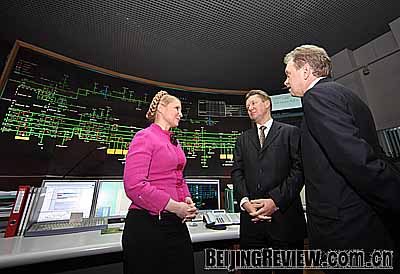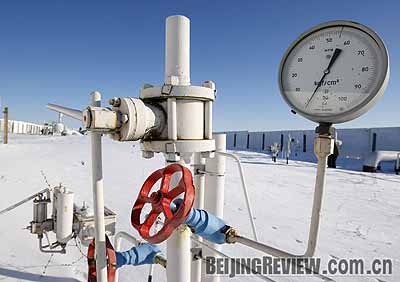|
 |
|
BACK IN BUSINESS: Ukrainian Prime Minister Yulia Tymoshenko (left), Gazprom CEO Alexei Miller (center) and Naftogaz CEO Oleg Dubyna talk at Gazprom's central dispatch office on January 20. Russia restored gas supplies to Ukraine and the EU that day (XINHUA/AFP) |
Europeans may not soon forget the cold January of 2009. Due to a price dispute, Russia first cut its natural gas supply to Ukraine-a key transit point for gas flowing from Russia to Europe-on the first day of 2009. The conflict affected gas supplies in 18 European countries for two weeks during a particularly harsh winter. After several rounds of negotiation, Russia and Ukraine signed a 10-year gas purchase contract for 2009-19 on January 19, putting an end to the dispute.
The conflict concerned gas prices, transit fees and unpaid debt. But observers say that money was not the only motive for Russia's behavior. "The fight between Russia and Ukraine can never be treated simply as a trade conflict," said Professor Yang Chuang from China Foreign Affairs University. He stressed that there were also political and military reasons leading to the dispute.
Reaching a deal
Ukraine and Russia must renew their gas supply contract every year. The past round of conflict began late last year when the two sides failed to agree on three issues: the price Ukraine would pay Russia for gas, the price Russia would pay Ukraine for gas transit to Europe, and how much the Ukrainian state energy company owed its Russian counterpart in debts and related fines.
 |
|
NO PRESSURE: The reading on a pressure meter at a gas station near Kiev points to zero on January 1. Russia cut its gas supply to Ukraine that day because of a price dispute (XINHUA) | For a long time, Russia has provided one quarter of the gas supply of the European Union (EU), moving 80 percent of it through Ukraine. The two countries had been quarreling over gas prices for several years. According to a Xinhua News Agency report, Ukraine's average annual gas consumption is about 80 billion cubic meters, three quarters of which come from Russia. Until now, Russia has sold gas to Ukraine at a subsidized price of $179.50 per 1,000 cubic meters, a huge discount from the $450 paid by EU countries.
By the end of 2008, the two state energy companies, Ukraine's Naftohaz Ukrainy and Russia's Gazprom, held widely different stances on the gas price and transit fee. Ukraine insisted the gas price should be $201 per 1,000 cubic meters in exchange for a higher transit fee, while Russia stuck to a price of $250, with no change in the transit fee. When Ukraine did not budge, Russia cut gas supplies to the country on January 1, and later halted all gas supplies to Europe after accusing Ukraine of siphoning off Europe-bound gas for its own use.
A monitoring deal mediated by the EU looked set to end the dispute on January 12, but Russia declared the deal void the next day after discovering Ukraine had attached a declaration absolving Ukraine of its debts and demanding that Russia provide 21 million cubic meters of free "technical gas" each day to support transit. Therefore, EU countries remained in the cold until Russia and Ukraine signed their 10-year agreement on January 19. The signing was witnessed by Russian Prime Minister Vladimir Putin, Ukrainian Prime Minister Yulia Tymoshenko, Gazprom CEO Alexei Miller and Naftohaz CEO Oleg Dubyna.
Under the contract, Ukraine will receive a 20-percent discount on gas from Russia in 2009, while the transit fee Russia pays Ukraine will stay the same. In 2010, both countries will start paying the market rate, meaning Ukraine will buy gas at European prices, while Russia will have to pay the market transit fee. Gazprom said this year it would export up to 120 billion cubic meters of gas to Europe and 40 billion cubic meters to Ukraine.
According to a January 20 Xinhua News Agency report, both Russia and Ukraine are satisfied with the deal. Russia has obtained a much higher price for its gas, because even with the 20 percent discount, Ukraine will pay $360 per 1,000 cubic meters in the first quarter this year, significantly more than the $250 that Russia originally offered. Moreover, Russia will enjoy the same transit fee this year.
The report also analyzed Ukraine's gains. Although the international price of oil recently fell to about $40 per barrel, current gas prices are still based on an oil price of $140. Russian President Dmitry Medvedev admitted on January 18 that natural gas prices could be halved this year. Even if the market rate falls to a fairly low level, Ukraine will pay even less under the deal. Tymoshenko said the average price Ukraine will pay for gas in 2009 would end up being less than $250.
"Compromise is their only choice," Yang from China Foreign Affairs University told Beijing Review. He noted that cutting off gas exports cost Russia about $1 billion. Ukraine, for its part, has to consider the EU's gas needs if it wants to gain NATO and EU membership.
|
